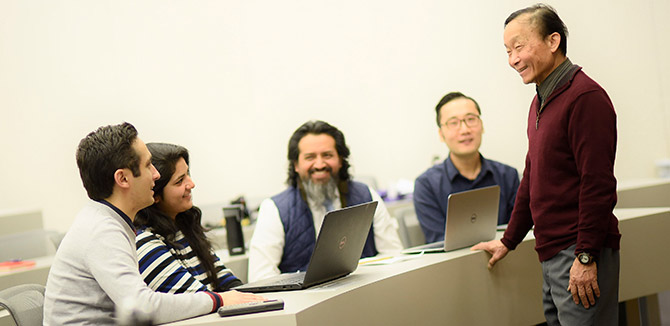Presenting to the Board
MSIT capstone course allows students to fine-tune their communication techniques
Each spring, the Northwestern University Master of Science in Information Technology (MSIT) program offers a capstone course on technology strategy and enterprise architecture. The course, taught by Prof. Alan Graves and members of the MSIT Industry Advisory Board (IAB) focuses on enterprise applications integration, which is a major focus of Chief Information Officers and other IT leaders.
Topics touched on in the course include:
- Defining data and application architectures based on business architecture
- Working with standard technical architectures
- The role of program and project management
- And more
This course provides several frameworks to facilitate the technical and management skills to meet demands of such integration efforts. An integrated case, based on the instructor's experience, is used throughout the course to provide the students with practice in the content of the course.
As part of the course, students also are required to make a formal presentation to the rest of the class — as well as IAB members, on occasion. It’s that component that makes the course stand out to IAB Chairman Kevin Glynn.
“It forces them to present a polished prepared solution to a problem,” said Glynn, CIO at DSC Logistics. “Most of the MSIT course work is casual dialogue. The capstone tests their ability to communicate technical ideas.
“It’s the closest thing we can do to represent real life presentations to a corporate board — something a CIO like myself has to do regularly.”
Jonathan Diehl (MSIT ‘18) recently took the course and described it as part boardroom preparation and part technical design.
“Imagine you had to pitch an idea to your companies board about how to implement a new technology,” said Diehl, the senior blended learning specialist in teaching & learning technologies in Northwestern IT. “That’s the kind of work you’ll be doing with your group mates.
“The capstone class really has you synthesize all the previous knowledge you’ve gained in the program and compile it into a comprehensive strategy or plan that you could present to your company.”
Glynn has had a storied career for himself, but as he reflects on the different opportunities present to MSIT students and the experience they get within the program, he can’t help but be a little jealous.
“This is the only program that truly trains IT leaders,” Glynn said. “The technical rigor ensures that you can hang with the brightest minds in any IT department or other engineering group, but (MSIT) also teaches non technical skills that work on management and leadership.
“I wish I had been able to take the program. A lot of the material would be really useful to any modern day CIO or VP of IT.”


